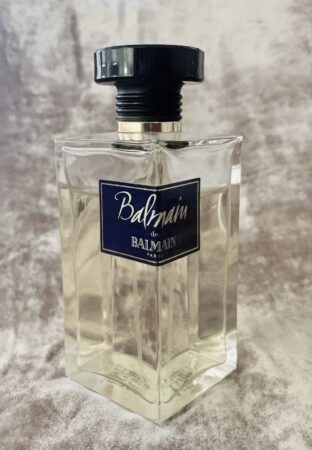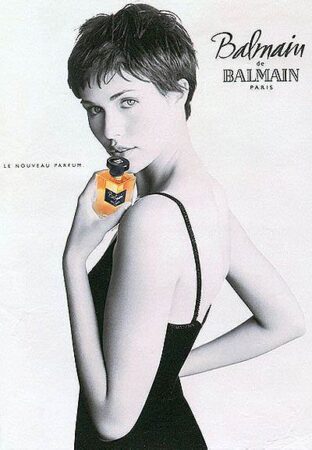
Ida’s Balmain de Balmain (colorized)
Since the first signs of Spring a few days ago, many of us began to crave the verdant floral chypres which enliven our step – those harbingers of vernal joy. I believe it’s safe to say that there exists a green for nearly everyone (unless you absolutely detest them altogether): powdery, sensitive ones; perky, saucy sparklers; the deeply romantic, mossy; floral and herbal explosions amongst them. Then, there are the Killer Chypres: the perfumes which favor the bold and take no prisoners. 1998’s Balmain de Balmain is a bona fide, card-carrying member of this particular clan. It took a fair amount of digging to unearth the perfumer, which happens to be the gifted Senior Perfumer at Givaudan Antoine Maisondieu (nose for several Commes Des Garçons scents and ETAT LIBRE D’ORANGE fragrances, including Jasmine et Cigarette and Fat Electrician). I doff my chapeau. It’s among the most genderless fragrances I’ve come across, and a striking example of just how good a killer can be.

Antoine Maisondieu, Senior Perfumer of Givaudan courtesy of Essential Parfums
One of the reasons you may not have come across Balmain de Balmain is that it had a short run; most likely, because it defied most categorization and people didn’t know what to make of it. The aromatic materials are top-notch; it possesses both potency and longevity, which is remarkable for eau de toilette. It was impossibly elegant, somewhat bitter, and couldn’t be comfortably classified as either a feminine or masculine scent. It helps to consider this in the actual milieu of 1998 – a pivotal year in perfumery – and a year that couldn’t make up its mind which way to go.
1998 saw the release of many Demeter fragrances (which were completely unique for their time and very affordable), such crowd-pleasing perfumes as Dior’s Hypnotic Poison, Keiko Mecheri Loukhoum, and Annick Goutal Petite Chérie. Serge Lutens’s feet were firmly under the fragrant table, blazing new trails: Muscs Kublaï Khän, Tubereuse Criminelle and Rahät Loukhoum were released the same year. The odd and unforeseen had their day in the sun: Maître Parfumeurs et Gantiers celery-inflected Grain de Plaisir, Le Feu d’Issey (now a much sought-after perfume unicorn), Jean Laporte’s (L’Artisan Parfumeur) quirkily exotic Navegar, and the famous Bulgari Black. 1998 witnessed many classics-to-be: Declaration by Cartier, Fendi’s Theorema, and L’Eau d’Issey amongst them. Heavy ambers continued to be highly popular: Aqaba (Thierry Wasser), Profumum Ambra Aurea, Ambra di Venezia, and Sarah Horowitz’s Perfect Love are excellent examples of this genre. Somehow, Balmain de Balmain fell between the cracks – after all, there were a minimum of 461 fragrances which were released that year.

Balmain de Balmain ad wiki
Balmain de Balmain is anything but shy. The first spritz knocks you over with fizzy aldehydes, bergamot, and an overdose of galbanum in hot pursuit. Floral piquancy of freshly ground black pepper meets the tangy fruity-green complexity of black currant buds; these buds are a bit jammy and possess a touch of cat urine undertone. Black currant absolute (think Ribena!) differs greatly from the buds, aka bourgeons de cassis: the bud absolute teaches us not to prejudge anything at first sniff – especially when we smell it in its undiluted form. In Balmain de Balmain, this material is magic when utilized as a counterpoint to the dulcet, velvety florals (jasmine, rose, iris and violet). The ionones impart a cool, soigné touch which is very compelling – and the fragrance only gets better, as we rest these beautiful aromatic contradictions atop a magnificent old school (but never dated or dreary) chypre base which includes the Golden Standard, Mysore sandalwood – in concert with real oakmoss, high-quality patchouli, and vetiver. That’s where the tonicity of a bright beginning morphs into mystery. Balmain’s drydown is masterful, intricate and otherworldly, like some subterranean fairytale. Earthy, but not of this terrestrial sphere – it thwarts description, which is probably why it didn’t become a commercial success.
In conclusion, Balmain de Balmain may be an acquired taste, in the manner that certain aromatic bitters in cocktails are: Campari, Amaro, Suze, Lillet, Cynar. They are polarizing, a love-or-hate affair. If you happen to love and/or admire this fragrance as I do, it can be a thoroughly gratifying experience.
Notes: aldehydes, Calabrian bergamot, galbanum, black pepper, black currant bud absolute, jasmine, rose de mai, iris, violet, patchouli, oakmoss, Mysore sandalwood, vetiver
Perfume is one I purchased, from my own collection. My nose is my own…
~ Ida Meister, Deputy, and Natural Perfumery Editor
Follow us on Instagram @cafleurebonofficial @idameister
This is our Privacy and Draw Rules Policy
